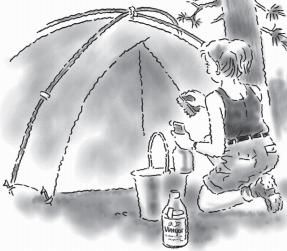: Remove stains that develop in clay flowerpots by filling them with 2/3 cold water and 1/3 vinegar. Let the pots soak until they look clean, then wash with soap and water, and rinse.
: A squirt of vinegar may help invigorate a plant and make it more resistant to disease and pests. Mix 1 ounce vinegar with 1 gallon compost tea, and use as a regular spray on garden plants.
: Mix 3 tablespoons natural apple cider vinegar in 1 gallon water. Fill garden sprayer with the mixture, and spray the roses daily to control black spot or other fungal diseases.
: If seedlings begin to mold while starting them in a damp medium, clean them with a solution of 1 part vinegar to 9 parts water, and transfer them to a new container. Spritz seeds regularly with this diluted mixture while awaiting germination.
: Boil 1 quart water, then add 2 tablespoons salt and 5 tablespoons vinegar. While still hot, carefully pour mixture directly onto weeds between the cracks on sidewalks and driveways.
